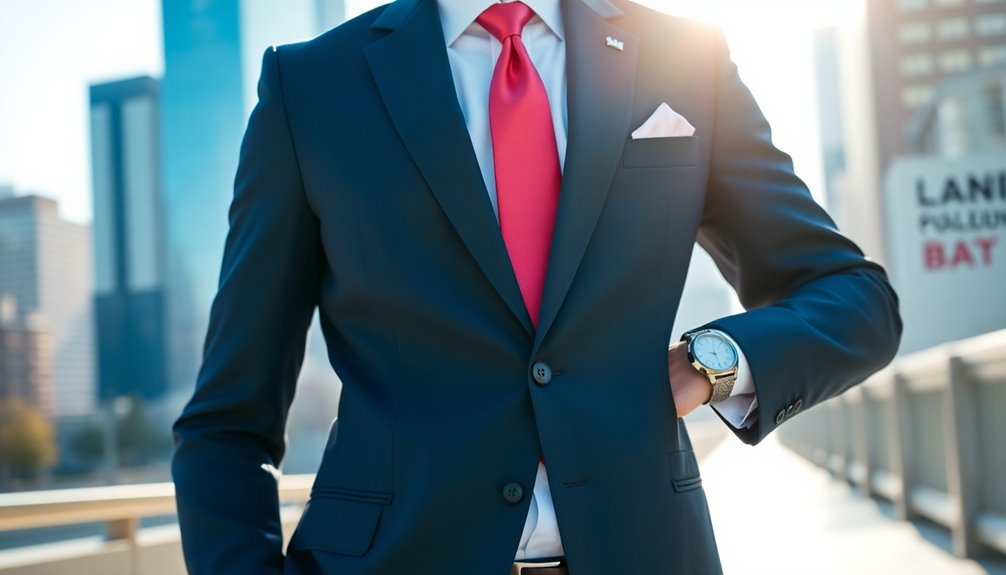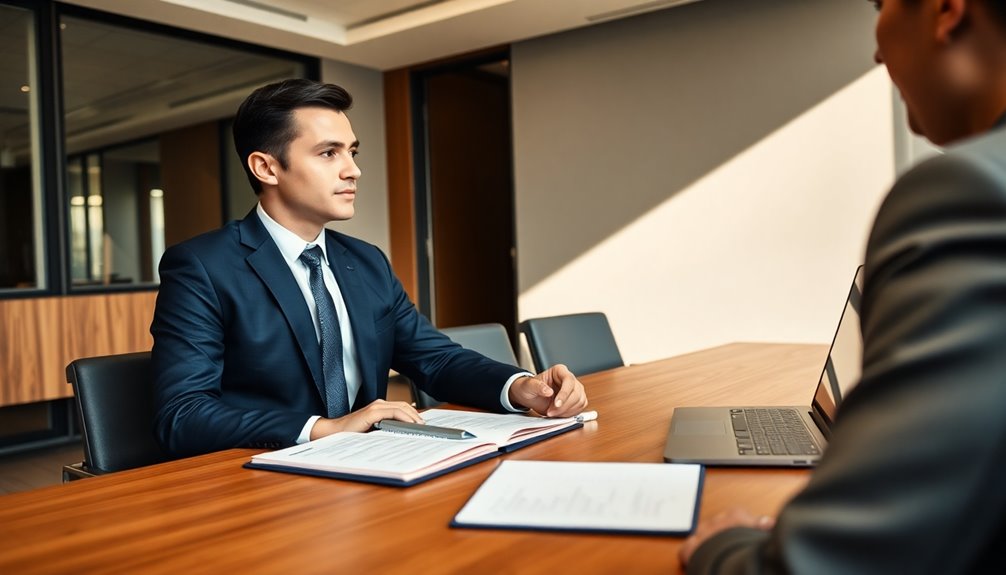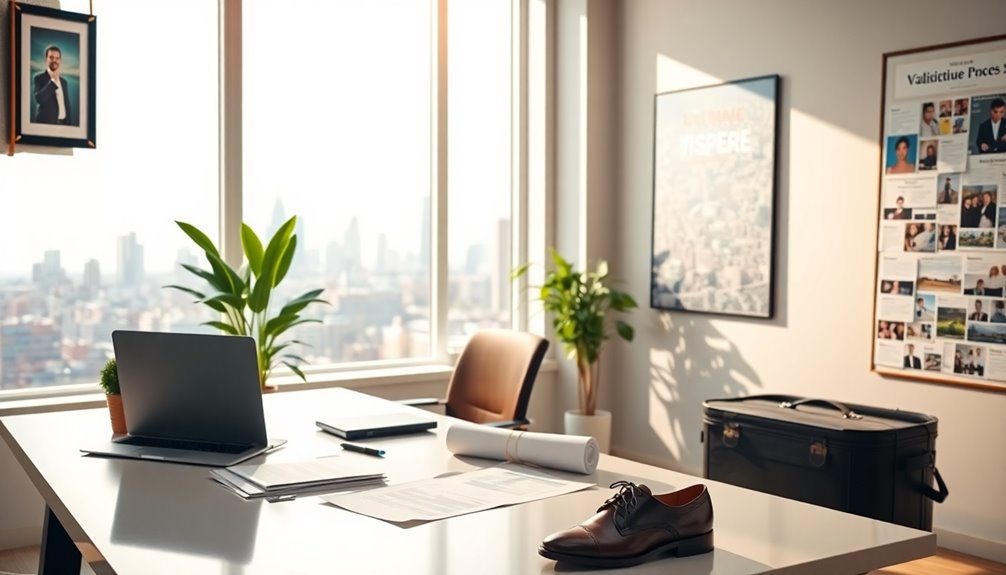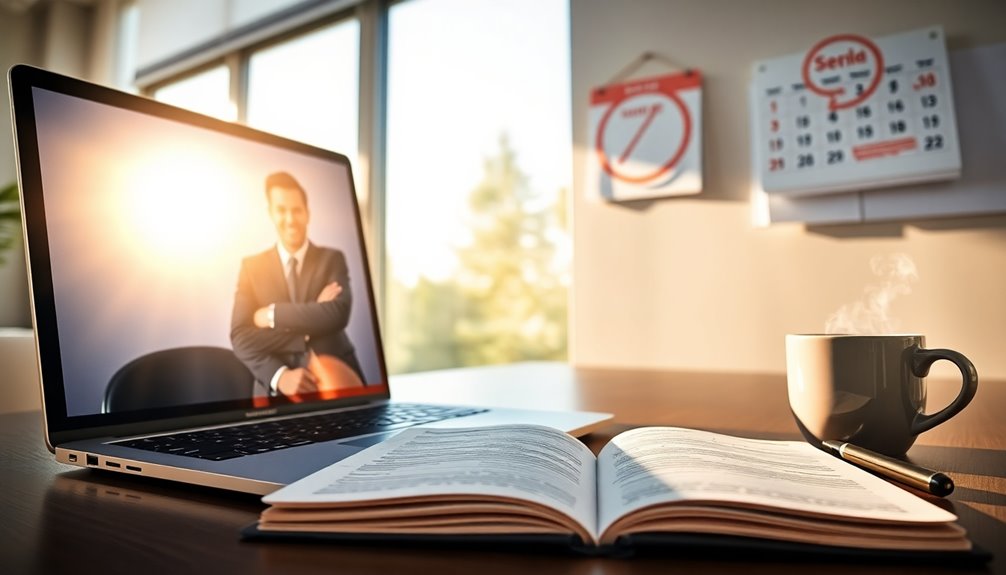To dress to impress and boost your chances of landing a job, you should aim for a polished, professional look that aligns with industry norms. For corporate roles, opt for a tailored navy or black suit paired with a crisp, light-colored shirt. If you're interviewing in a business casual environment, a well-fitted blazer with tailored pants works wonders. Always prioritize comfort and fit, as these enhance your confidence. Remember, first impressions are made in seconds, so look neat and groomed. Curious about more insider tips to ace that interview? There's more that can set you apart.
Key Takeaways
- Choose a tailored navy or black suit paired with a light-colored shirt for a polished and professional appearance.
- Opt for polished shoes that complement your outfit, avoiding overly casual footwear like sneakers or sandals.
- Ensure your clothing fits well, maintaining a clean and neat look; avoid anything too tight or loose.
- Incorporate minimal, matching accessories to enhance your professionalism without being distracting.
- Arrive early, practice good grooming, and master non-verbal cues to create a positive first impression.
Importance of Dressing Professionally

Dressing professionally is vital for making a strong impression in job interviews and the workplace. Your outward appearance serves as the first glimpse of your judgment skills, and inappropriate attire can signal a lack of respect for industry standards. According to Kim Zoller at Image Dynamics, 55% of a person's perception is based on how they look.
When you dress appropriately, you demonstrate an understanding of workplace norms and show respect for your employer, clients, and the interview process. Moreover, appropriate attire reflects your seriousness about the job and your ability to adapt to corporate culture. It's not just about looking good; it's about projecting confidence and readiness. When you wear professional clothing, you're more likely to feel confident and perform well, even in telephone interviews. Employers assess judgment based on attire choices during interviews.
First impressions are vital, and the right outfit sets the tone for your success. A polished appearance conveys attention to detail and dependability, helping you stand out from the competition.
Understanding Industry Norms

Traversing the landscape of industry norms is essential for making the right wardrobe choices for job interviews and professional settings. Each industry has its own dress code expectations, ranging from business formal in law and finance, to business casual in more relaxed environments. Understanding these distinctions helps you present yourself appropriately.
In business formal situations, tailored suits and polished shoes are a must. For business professional roles, opt for blazers and dress shirts while steering clear of jeans. Business casual allows for a bit more flexibility, but avoid overly relaxed attire like sneakers or ripped jeans. In startups, even if the everyday dress code is laid-back, approaching interviews with a formal look can set you apart. The shift towards more casual dress codes reflects broader cultural shifts in the workplace.
Pay attention to colors and patterns as well; neutral tones like black, navy, and gray are safe bets. Keep patterns subtle to maintain professionalism. Make certain your clothes fit well, are clean, and convey a polished image.
Finally, always match your accessories. By aligning your outfit with industry norms, you'll enhance your chances of making a memorable impression.
Tailoring Attire to the Position

When it comes to tailoring your outfit for a specific position, understanding the nuances of the workplace is essential. By doing a bit of research, you can align your attire with the company's culture and expectations.
Here are some tips to keep in mind:
- Research the company's dress code: Check their website and social media for clues about workplace attire.
- Match your outfit to the environment: For casual workplaces, consider professional-looking casual attire, while formal settings may require a tailored suit. Culturally intelligent individuals are better equipped to assess cultural differences that influence workplace norms.
- Dress for the industry: Different industries have varying norms, so guarantee your outfit reflects that. A professional appearance can significantly impact how you are perceived in an interview.
- Prioritize cleanliness and fit: Always wear clean, pressed clothing free of defects to convey professionalism.
- Choose comfort wisely: Wear clothes that make you feel confident and comfortable, as this will positively impact your performance.
Key Clothing Items to Consider

Choosing the right clothing items can greatly impact your job interview success. First, consider the company culture. If you're interviewing in a corporate environment, opt for a navy, black, or grey suit paired with a crisp white or light-colored shirt. Men should wear a tie, while women can choose closed-toe shoes, flats, or heels, complemented by classic jewelry that isn't too bold. Additionally, having a strong brand identity can also help you feel more confident in your outfit choice and presentation during the interview, which correlates with customer loyalty.
For business casual settings, a blazer with tailored pants or a skirt works well. You can wear a button-down shirt or blouse, and loafers or comfortable heels are ideal. In creative or tech companies, smart-casual attire like chinos and a nice shirt or a stylish dress is appropriate, but steer clear of overly flashy pieces. Regardless of the setting, guarantee your clothes fit well—nothing too tight or loose. Opt for breathable fabrics that allow for comfort and ease of movement. Appropriate dressing is essential as it indicates seriousness and professionalism.
Finally, pay attention to grooming and keep accessories minimal to maintain a professional appearance. By carefully selecting these key clothing items, you'll enhance your chances of making a lasting impression.
Preparing for First Impressions

In just a matter of seconds, you can shape the way interviewers perceive you, making preparation for first impressions essential. To guarantee you make the best impact, here are some key aspects to focus on:
- Arrive early: Aim to show up 10 to 15 minutes before your interview.
- Prepare multiple resumes: Bring several copies to hand out if needed.
- Practice your responses: Rehearse answers to common interview questions to boost confidence.
- Master non-verbal cues: Maintain eye contact, offer a firm handshake, and smile genuinely.
- Dress for the company culture: Research the dress code and adapt your outfit accordingly. Additionally, remember that 30% of interviewers decide within the first five minutes of an interview, making your initial presentation even more important.
Frequently Asked Questions
How Can I Determine the Dress Code of a Company?
To determine a company's dress code, start by reviewing their website and social media for clues.
Observe what employees wear during visits or events, and check job descriptions for any guidelines.
You can also ask current or former employees about their experiences.
If you're still unsure, don't hesitate to reach out to HR or the person scheduling your interview for specific dress code recommendations.
This'll give you a clear understanding of what's appropriate.
What Should I Do if I Have Visible Tattoos?
If you've got visible tattoos, don't fret! Imagine walking into an interview, your ink telling a story of creativity and individuality.
First, research the company's culture; many embrace tattoos as a form of self-expression.
Dress smartly to complement your tattoos, ensuring they shine rather than overshadow your professionalism.
If you're unsure about acceptance, consider covering them for the initial meeting, but always be ready to discuss their significance if asked.
Is It Acceptable to Wear Casual Shoes to an Interview?
Wearing casual shoes to an interview isn't generally acceptable. You want to project professionalism, so opt for formal or business casual footwear instead.
Think polished loafers or classic oxfords that align with the company's dress code. Casual shoes, like sneakers or sandals, can give a laid-back impression that mightn't suit the interview setting.
Always prioritize looking sharp and put-together to make a strong first impression on your potential employer.
Can the Weather Influence My Interview Attire Choice?
Absolutely, the weather can notably influence your interview attire choice.
You'll want to take into account both the outdoor conditions and indoor temperatures. For cold weather, layer your outfit with a formal coat, while in warmer climates, opt for breathable fabrics.
If it rains, a stylish, water-repellent coat is a smart move.
Always aim for a professional appearance, ensuring comfort and practicality in your outfit to avoid distractions during your interview.
What if I Don't Own a Formal Suit?
If you don't own a formal suit, don't sweat it! You can still look sharp.
Opt for business casual attire like khakis and a button-down shirt or blouse. A blazer can elevate your look if needed.
Make sure your clothes fit well and are clean.
Also, research the company culture and dress accordingly.
Conclusion
In the tapestry of job hunting, your attire weaves a powerful narrative. By dressing professionally and aligning your outfit with industry norms, you set the stage for success. Remember, the right clothing can sparkle like a guiding star, illuminating your potential. As you prepare to make that all-important first impression, let your outfit be a reflection of your ambition and confidence. Dress to impress, and you'll not only catch their eye, but also their respect and interest.









